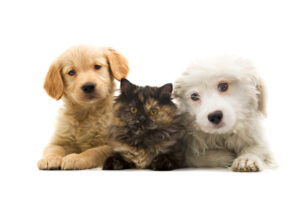
Knowing about common pet poisons in the home can help you protect your furry companions from accidental harm.
As pet owners, we do our best to create a safe and loving environment for our furry friends. However, many common household items can be toxic to cats and dogs, leading to serious health issues or even fatalities. Understanding these dangers and taking precautions can help protect your beloved pets from harm. Keep these common pet poisons in the home out of reach of your furry companions.
Human Foods
While it’s tempting to share our meals with our pets, some human foods can be toxic to them. These include:
- Chocolate: Contains theobromine, which can cause vomiting, seizures, and even death in pets.
- Grapes and Raisins: Can lead to kidney failure in dogs.
- Onions and Garlic: Damage red blood cells and can cause anemia.
- Xylitol: A sugar substitute found in gum and baked goods that can cause severe hypoglycemia in dogs.
Household Cleaning Products
Many cleaning supplies contain harsh chemicals that can be dangerous if ingested or inhaled. Products to be cautious of include:
- Bleach and Disinfectants: Can cause respiratory issues and chemical burns.
- Laundry Detergents and Fabric Softeners: Harmful if swallowed and can lead to gastrointestinal distress.
- Floor Cleaners and Carpet Fresheners: Some contain toxic ingredients that pets may ingest by licking their paws.
Medications
Both human and veterinary medications can pose a risk if not stored properly. Common toxic medications include:
- Ibuprofen and Acetaminophen: Can cause severe liver and kidney damage in pets.
- Antidepressants: Certain antidepressants can lead to neurological issues and heart problems.
Plants and Flowers
Many indoor and outdoor plants are poisonous to pets. Some of the most dangerous include:
- Lilies: Extremely toxic to cats and can cause kidney failure.
- Poinsettias: Can cause irritation and vomiting if ingested.
- Aloe Vera: Though beneficial for humans, it can cause digestive upset in pets.
- Sago Palm: Highly toxic, leading to liver failure and potentially deadly if ingested.
Pesticides and Rodenticides
Products used to eliminate pests can be deadly to pets. Be cautious with:
- Rat Poison: Can cause severe internal bleeding or neurological issues.
- Slug and Snail Bait: Often contains metaldehyde, which is highly toxic to pets.
- Insecticides: Many contain harmful chemicals that can cause tremors, seizures, or organ failure.
How to Keep Your Pet Safe
Now that we know the common household dangers, here are some essential tips to keep your cat and dog safe:
- Store Toxic Items Securely: Keep all medications, cleaning products, and food items in cabinets or shelves out of your pet’s reach.
- Be Mindful of What You Feed Them: Stick to pet-safe treats and ensure family members know what foods are off-limits.
- Choose Pet-Friendly Plants: Research pet-safe plants before adding them to your home or garden.
- Use Pet-Safe Cleaning Products: Opt for natural or pet-friendly cleaning solutions to reduce risk.
- Monitor Your Pet Outdoors: Be aware of any toxic plants or chemicals in your yard and remove them if necessary.
- Know Emergency Procedures: Keep your veterinarian’s contact information handy, along with information on the closest emergency vet and the number for the ASPCA Animal Poison Control Center (888-426-4435).
Trust Maryland Veterinary Surgical Services With Your Companion’s Health
Your companion’s health is important, and the team at MVSS is ready to provide the best care possible for your furry family. We are dedicated to combining comprehensive exams and assessments with informative and honest discussions of your companion’s care. Once we have worked with you to decide on the best course of action for your dog, our professionals will use their surgical expertise to work towards the goal of giving your companion an active and pain-free life. We are proud to serve loyal companions in Catonsville and Baltimore. To learn more about our services, give us a call at 410-788-4088 or visit us online. For more information and tips for dog health, follow us on Facebook and Pinterest.
